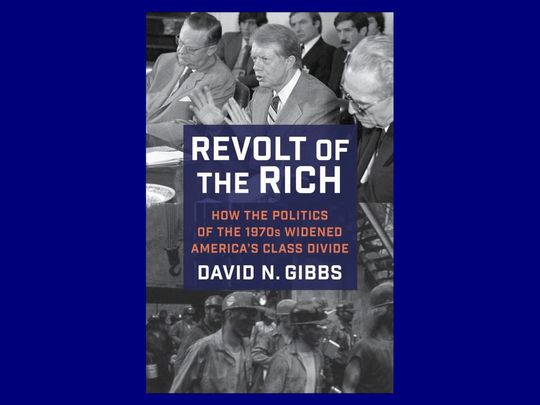
David N. Gibbs’ The Revolt of the Rich (published 2024, Columbia University Press) takes readers on an incisive and deeply researched journey into the origins of America’s vast and growing economic inequality.
While many credit the rise of neoliberalism to the Reagan-Thatcher years, Gibbs makes a compelling case that its foundations were laid much earlier, during the presidencies of Richard Nixon and Jimmy Carter.
The book reframes this critical period in U.S. history, shedding light on how two seemingly contrasting administrations—one conservative, the other ostensibly liberal—shaped policies that would fundamentally alter the nation’s economic trajectory and political landscape.
At its heart, The Revolt of the Rich seeks to answer an unsettling question: how did a democratic society come to tolerate, even normalise, the dramatic concentration of wealth in the hands of a narrow elite?
Today, inequality in the United States has reached staggering levels, with a disproportionate share of wealth controlled by the richest.
Gibbs argues that this shift was neither inevitable nor accidental. Rather, it was the product of deliberate and coordinated efforts by elites who built coalitions across business, social, and political lines to advance their interests at the expense of the working class.
Reshaping public discourse
The book reveals how these coalitions were carefully constructed. Nixon’s administration, for instance, quietly encouraged corporate leaders to pour money into conservative think tanks, which then became vehicles for reshaping public discourse.
Simultaneously, Nixon populated federal agencies with free-market economists who would craft policies aimed at deregulating industries and weakening labour protections.
Carter’s administration, despite its liberal reputation, continued this trend with financial deregulation and austerity measures that eroded the economic security of ordinary Americans. These policies, Gibbs contends, were not just missteps—they were pivotal in dismantling the post-war social democratic consensus.
A particularly striking aspect of Gibbs’ analysis is his focus on the role of intellectuals and academics in legitimising this transformation. Through well-coordinated influence campaigns, these figures sold laissez-faire economics to both policymakers and the public, justifying decisions to cut social spending, offshore jobs, and dismantle organised labour.
Gibbs paints a vivid picture of how these ideas were not merely theoretical exercises but tools of power, used to align public sentiment with elite interests.
Push for militarisation and intervention
The book also exposes the darker side of this ideological shift: a simultaneous push for militarisation and expanded U.S. intervention overseas, tying neoliberal economic policies to a broader strategy of global dominance.
Gibbs’ narrative is both sweeping and precise, capturing the interconnectedness of political, economic, and social forces. His critique is unsparing yet balanced, as he avoids reducing complex historical processes to simplistic villains or heroes.
While the Reagan-Thatcher era often dominates discussions of neoliberalism, Gibbs convincingly argues that Nixon and Carter deserve closer scrutiny.
Their administrations planted the seeds for the economic and political transformations that have since entrenched inequality, weakened democratic institutions, and left many Americans struggling to make ends meet.
What sets The Revolt of the Rich apart is its ability to connect the past to the present. Gibbs shows how decisions made in the 1970s have cascading effects, shaping today’s reality in profound ways.
He also challenges readers to rethink common assumptions about power and democracy, asking how a system ostensibly designed to serve the many could be so effectively harnessed to benefit the few. This is not just a history book; it’s a call to examine the structures and narratives that continue to uphold inequality.
David N. Gibbs, a professor of history at the University of Arizona, brings a wealth of expertise to this work. For readers seeking to understand how America arrived at this moment of extreme inequality—and what it might take to chart a different course—The Revolt of the Rich is essential reading.
Gibbs doesn’t just revisit history; he reframes it, offering a fresh perspective on the forces that have shaped the modern United States. This book is a powerful reminder that the choices of the past are never just history—they are the foundation of the present and the keys to the future.
Ahmad Nazir is a UAE based freelance writer, with a degree in education from the Université de Montpellier in Southern France









